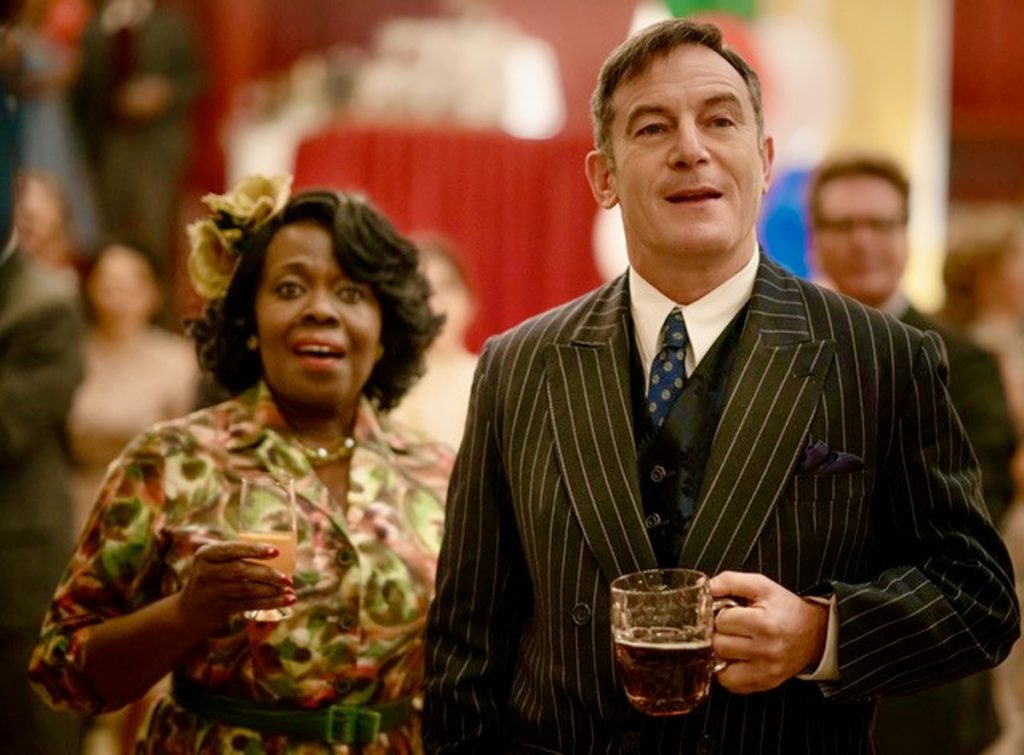By Dwight Brown
NNPA Film Critic
(***) “You’re a dreamer.” That’s what her friends say. That’s her essence.
Middle-aged Ada Harris (Lesley Manville, The Crown) works tirelessly as a housekeeper for rich folks in 1950s London. She scrubs, sews and keeps things tidy for wealthy, impervious snots. Her husband Eddie, a solider, went missing and never returned from WWII. She’s alone and grieves him daily. Her life is all routine until the day she spies and covets a pink haute couture Christian Dior dress in a client’s closet. Ada imagines herself in it. She obsesses about having her own Dior frock.
The title of the film, adapted from the 1958 novel Mrs. ‘Arris Goes to Paris by Paul Gallico, spills the rest of the beans. In a script by writer/director Anthony Fabian and cowriters Carroll Cartwright, Olivia Hetreed and Keith Thompson, many characters are added to Mrs. Harris’ quest. Some flesh out her persona: her fellow housekeeper and gal pal Vi (Ellen Thomas) encourages her, their mutual friend a racetrack cashier named Archie (Jason Isaacs, Mass) watches over her and insensitive bosses test her patience.

By the time the widow reaches the prissy steps of the House of Dior in Paris, a slew of other folks enter her life: Madame Colbert (Isabelle Huppert) the condescending Dior manager is meaner than Cruella, André (Lucas Bravo) is a young ambitious accountant, Natasha (Alba Baptista) works the runway as Dior’s top model, Marquis de Chassagne (Lambert Wilson) is an eligible aristocratic widower, there are countless Dior employees and friendly homeless men too. Less of these supporting people would have been better. Though the André and Natasha pairing adds a Love Actually flair and the Marquis provides a suitable fantasy love interest.
What the script gets right is creating magical and problematic moments that can be a blessing and a curse. Like the wonderful time a soldier, cop and friend show up at her door bearing gifts or when Ada is dehumanized and maltreated her first day at Dior. The opposing good and bad forces are unpredictable and just enough to keep viewers guessing and entertained.
As a director, Fabian prefers the fanciful—almost Disneyish—approach to filmmaking rather than realism. Lots of the interiors look constructed (Luciana Arrighi) and the sets fluffy (Nóra Talmaier). Though the Dior clothes should be arty and refined, Ada and Vi’s own working-class garb (Jenny Beaven) looks too off-the-rack. The music (composer Rael Jones) almost seems too fairytale, until it crescendos in a fashion show sequence where swooping string music perfectly embellishes a well-directed scene.
Fabian and cinematographer Felix Wiedemann (sometimes his camera tricks simulate spatial warps) aren’t afraid to make the visuals seem whimsical versus real. This is where the director’s glimpse at the British working class distinguishes itself from the works of Mike Leigh and Ken Loach who’ve tread similar territory. Those directors made you see, smell and feel the sweat of proletarian life. In this 1h 55m com/dra/rom everything is too impeccable. Even the curls on Ada and Vi’s heads are perfectly placed.
For every advance toward Ada’s goals the script pours on obstacles, setbacks, miscommunications and roadblocks. But somehow the plucky Ada tries to persevere, and that indomitable spirit overrides any of the film’s debatable creative decisions.
Ada is vulnerable, opinionated, tenacious, brave and endearing. Especially as played by Manville, who is deft at turning her emotions on and off. This kind of role is usually played by fellow veteran British actors like: Brenda Blethyn (Secrets & Lies), Crissy Rock (Ladybird, LadyBird), Julie Waters (Educating Rita) and Miranda Richardson (The Crying Game). Manville’s work is of that caliber. Her character and its duck-out-of-water storyline is so indelible it could spawn a U.S. remake. Imagine a 54-year-old Julia Roberts (Pretty Woman) in the lead role as the scrappy interloper.
If viewers get stuck on the “this would never happen in real life” notion, they will miss the point of this charming tale. When Ada fights against her detractors, from her snobby bosses to Mme. Colbert, she’s standing up to the elitists who want others to stay in their place. It’s a very accessible theme.
“It’s my dream, and my dreams are as good as anybody else’s.” Ada articulates what many daydreamers think. Her spunky verve may help this enchanting film reach a wider audience than the women of a certain age who will love it.
Visit NNPA News Wire Film Critic Dwight Brown at DwightBrownInk.com.




